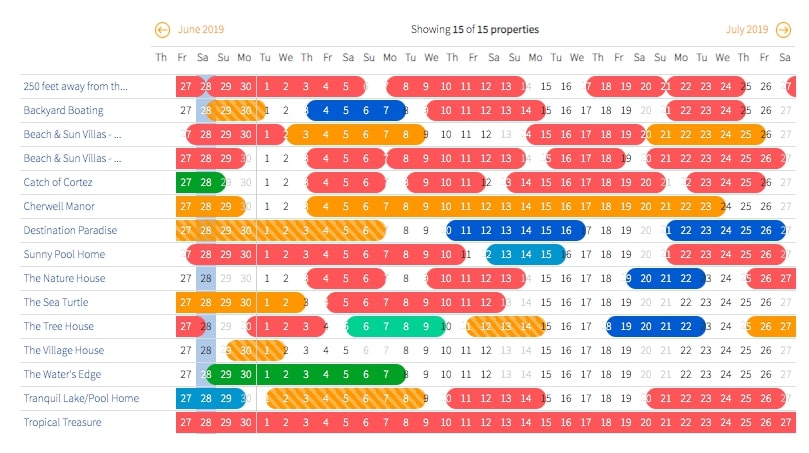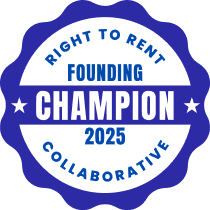Creating a vacation rental business plan isn’t just about securing financing or finding properties to manage; it’s also about having a roadmap for business growth.
Business plans anticipate possible mishaps so that you can prepare for them in advance. They also let you set milestones to guide your business development. Finally, vacation rental business plans can help you secure financing to fuel your business’ growth.
A business plan takes time and it can be intimidating to know where to start, but it doesn’t have to be. If you’re wondering where to begin or what to include, we’ve got your back! Using this comprehensive guide, you can develop a vacation rental business plan using the downloadable template provided.

Click to download (It’s free!)
Vacation Rental Business Plan Template
Fill out each section of this vacation rental business plan, and determine your strategy to achieve financial, marketing, and business goals.
What is a vacation rental business plan?

A vacation rental business plan describes the steps to reach your financial, marketing, and business goals. It should assist you and potential investors in understanding your short-term rental business’s profitability.
Along with describing the goals, strategy, and tactics, you should also use this plan as a guide to ensure you’re headed in the right direction.
Why do you need a vacation rental business plan?
A vacation rental business plan prepares you for the future as it anticipates goals, milestones, and possible mishaps. But a vacation rental business plan can also help you secure financing, plan for the long term, set clear goals that increase your chance of success, and budget sensibly.
1. Secure financing
Just like you wouldn’t lend your car to a friend who doesn’t know how to drive; banks won’t lend you money if you can’t prove that you’ll pay them back.
A vacation rental business plan is a way of letting potential investors know that you have a strategy in place to build a profitable business.
2. Plan for the long term
Planning for business growth allows you to choose tools and systems from the beginning that will scale with you. For example, without long-term planning, you might end up having to change your property management system (PMS) in the future as the needs of your business outstrip the feature set of the cheap solution you chose without future growth in mind. Being able to plan for what you’ll need as you grow will ultimately save you time and money.
3. Set clear goals
It’s easier to achieve success if you first define what success looks like and give yourself clear goals to work towards. These goals should be measurable and achievable, for instance, establishing you need a 60% occupancy rate in your first year to cover costs. If you’re succeeding in meeting some of your goals but falling short when it comes to others, you’ll be able to identify where you need to make changes in your business.
4. Budget with confidence
Running the numbers and having a plan that backs up your vacation rental property investment reduces the luck element of buying real estate. Having a business plan with financial projections allows you to allocate a realistic budget for renovations, furnishing, decoration, software, permits, and staff.
A business plan will help you anticipate cash flow issues you may face. For example, as your reputation builds, your property may have fewer bookings at first, so some expenses will be out of pocket.
What to consider before creating a business plan for your short-term rental business
Before you start writing your business plan for your STR business, you should:
1. Do your research
Make sure you research to understand local laws, the challenges presented by the location of your properties, and the types of units you’re going to be investing in.
Local laws
Review local laws, regulations, or restrictions before buying a second property or turning your home into a short-term rental business.
You should also look into what’s being discussed in the media about the market you’re researching. There may not be a law yet, but there are rumors that vacation rentals will be prohibited and you should know about it.
Location
Location can also determine your rental’s profitability. If you buy or manage a vacation property in an up-and-coming location, or a place that has a nearby attraction, your place might be in high demand. Location is also important when looking for possible cleaners or maintenance workers. A cabin in the woods sounds nice until no one wants to drive there to clean it or fix a broken pipe.
Type of unit
You should look at the market to understand which types of units you should be managing and what challenges they present, as well as how profitable they might be. You can rent nearly anything:
- Tree houses
- Glamping domes and yurts
- Apartments of different sizes
- Lofts
- Family homes
- A night in a Tesla parked in your garage (yes, really)
Compare existing listings against similar units in your location to get an idea about how much guests are willing to pay to stay in them, how much demand exists in your area, and what amenities will set you apart from the rest.
Furnishing and renovations
Determine how much money and time you’ll need to renovate and furnish your unit. Find out what sort of amenities are expected in your area and what extra things you could invest in to give yourself a competitive advantage.
2. Choose your business model

Source: Airbnb.com
If you’re buying properties to rent rather than simply managing properties on behalf of owners, there are several different business models to consider:
- House Hacking. If you’re accessing a loan for buying your primary home, you might get to invest less money but you’ll need to use the property as your home. In that case, you can use house hacking to rent your guest room or your studio to reduce the mortgage out-of-pocket payments.
- Glamping. Some countries offer loans for purchasing glamping domes or yurts. It’s also less expensive than purchasing a property and it can be quite profitable. You can rent your dome or yurt from $150-400 a night.
- Rent your property. If you take out a loan for a vacation home, you can rent the property to pay for the mortgage and make a profit.
- Rental arbitrage. This STR business model requires almost no initial investment from your end other than the costs related to renting an apartment. In the rental arbitrage model, you sublet an apartment on Airbnb, Vrbo, or any other OTA to pay for rent and make a profit. Your landlord should be notified and give you written consent if they approve.
3. Consider financing options
Your vacation rental business plan is also a way to pitch your company to potential investors. If you’re about to start a property management company, creating a business plan is a great way to formalize it.
Depending on your business model, you’ll have access to different financing options that have very different initial payment rates. When you know how much money you can invest upfront and who your target investors are, you can tailor your vacation rental business plan accordingly.
4. Determine profitability
Before you buy or agree to manage any rental property, you should run a competitive analysis to determine if it’s going to be profitable. You can use tools like Vrolio or AirDNA to estimate expenses, nightly rates, and estimated occupancy. Make sure you run your calculations on cautious scenarios. Never estimate 100% of occupancy. If it’s your first STR, estimate vacancy at around 45-50%.
Even Rob Abasolo from Robuilt who has various successful STR properties doesn’t run estimates assuming a perfect year. “I wouldn’t calculate my numbers based on a 100% occupancy rate,” Abasolo shared. “When I’m running the numbers to see if a deal works, I’m typically running my calculations at an 80% occupancy rate.”
What to include in your short-term rental business plan?
Your business plan is a living guide that contains all your goals for your business and how you plan to achieve them. That’s why it contains goals, milestones, and an initial financial forecast. It’s an outline of what you’re planning to do, why you’re doing it, and how you’re going to succeed. You can present this as a one-pager or a longer form shareable document.
This document should stand alone and only by reading it your potential investors and property manager should be able to know what your goals are and how to achieve them. For it to be complete, you need to fill in every section presented in this list.
Click to download (It’s free!)
Vacation Rental Business Plan Template
Fill out each section of this vacation rental business plan, and determine your strategy to achieve financial, marketing, and business goals.
1. Executive summary
This section is an overview of your business, you should mention:
- Who you or the property owners are
- The skills you excel at
- Your experience in the business
- Your short and long-term objectives
- The location of your vacation rental (mention nearby attractions)
- Your business model (house hack, glamping, second home, or rental arbitrage)
- A broad description of your guest persona
- If it’s a seasonal rental, for example, a beach house for summer
2. Company description
In this section, you should get into more detail about your company. Talk about your mission statement, unique selling point (USP), and value proposition (more on this later!)
If this is your first investment property, create those statements and include them here. You can adjust future plans as your business grows.
3. Business goals
The first two sections of the business plan give readers a broad overview of where your business is headed. Here is where you get to explain in detail what you’re aiming to achieve with your vacation rental.
You can follow any goal-setting methodology that you prefer—S.M.A.R.T, H.A.R.D, or W.O.O.P. The important thing is that you set objectives for different aspects of your business. Answer the questions below to get some ideas:
- Financial
- What’s your minimum acceptable CoC return?
- What’s the minimum occupancy rate you need to meet your expenses?
- What’s your expected monthly profit?
- What percentage of your total revenue goes into operations and expenses?
- Operational
- Do you need to hire a team? If so, how will you rate their performance?
- What are the tools that you need to learn how to use?
- What aspects of your business can be automated?
- How are you planning to improve the guest experience?
- Marketing
- Are your listings SEO optimized? How are you measuring success?
- Will you promote using a mix of niche and popular OTAs?
- What’s your plan to increase direct bookings?
- Are you using social media to promote your listing?
4. Guests personas
A huge part of marketing your property is defining who you are talking to. Do you want your property to be used by families, expats, digital nomads, or college students?
Defining your guest persona allows you to determine your value proposition, unique selling points, and marketing strategy. Include their:
- Demographics
- Motivations
- Interests
- Behavioral characteristics
- Booking habits
- Preferred OTA
If you have a pet-friendly property and you want to attract dog owners, then, your marketing strategy will be more successful if you promote on niche listings like BringFido along with global listing sites.
5. Value proposition
Your value proposition is how your guests will perceive your property compared to others. Why should guests choose your property? What’s your added value?
Maybe you offer flexible check-in or you offer a discount to the local museum. Define how you’re improving the guest experience and write it down, that’s your value proposition.
6. Competitive analysis
Analyze your competitors and the industry to determine what makes your property different from others and how you can position that difference as a unique selling point (USP). This is different from your value prop. Your USP is how you’ll differentiate your property and listing when you’re selling it; the value proposition is how you’ll improve the overall guest experience.
For example, let’s say you bought soundproof windows and a memory foam mattress that guaranteed a good night’s sleep, that’d be your value proposition. If you offer one free night to guests who book a three-day stay, it becomes your unique selling point.
You can use tools like Zillow and AirDNA to look into your local competitors and ask yourself if your property is better than other competitors because you:
- Offer a better location
- Is it easier to access using public transportation?
- Is it closer to the beach or the main city attraction?
- Is it downtown?
- Offer a cheaper price
- Is the price-value ratio better than the competition?
- Does it have discounted rates on certain days of the week?
- Bought in a fancy building
- Does it have better amenities?
- Does it look clean and new?
- Have a more professional-looking listing
- Does it have a copy that converts?
- Is the description clear?
- Does it have professional photography?
You should also define which listing sites your competition is using and see if there’s any room for improvement.
7. Operations and teams
Your operation plan is a rundown of how you’ll operate your business, how much it’ll cost, and which tools you’ll use. Some tasks you should outline include:
- Inventory management
- How are you going to account for everything that’s in your property?
- How are you planning to restock the lost or broken items?
- How many times a year will you do an inventory check?
- Staff
- Are you hiring a team to work full-time on your property?
- Did you already hire a cleaning and maintenance agency?
- Software
- Are you managing your Airbnb using software?
- How are you managing different channels and distribution?
- Are you outsourcing your operations to a property management platform like Hostfully?
- Bookkeeping
- Do you have a tool to keep track of your accounting?
- Are you hiring someone to do it for you?
- How are you keeping track of your escrow, insurance, and taxes payments?
- Smart appliances
- Are you adding smart keyless locks, plugs, and lightbulbs to save time and power?
- Guest communication
- How are you communicating with your guests?
- Are you building any automations?
- Are you using a vacation rental management platform like Hostfully to automate guest messaging?
8. Expenses
List all of your fixed and variable costs including:
- Mortgage payments
- Staff members (if any)
- Hospitality tools like property management system, channel manager, and dynamic pricing
- Utility bills (water, power, internet)
- Credit card installments for furnish
- Taxes and insurance
You should have that information from your research stage and your profitability analysis. Then, based on your total expenses, you determine the minimum and maximum nightly rates that you’re able to offer based on a safe estimated occupancy rate.
So, let’s say your expenses are $2,300 a month and you’re estimating a 60% occupancy rate. That means that you’re expecting your property is booked for at least 18 days each month. That makes the minimum nightly rate $128. If you compare against similar properties and your rate is too high, you should look into a different market, see where to cut expenses, or offer a premium experience.
9. Pricing and revenue management
There are tools like Vrolio that allow you to define your base nightly rate based on your expenses and your competitors automatically. A good tip is to launch your property with a low nightly rate to get eyeballs on your property, get momentum, and start collecting reviews.
Having a pricing strategy for your vacation rental lets you start with a low nightly rate and once you have a set of positive reviews that make your listing more accurate, you can start adjusting your prices. A great way to ensure your prices are adjusted to match demand is by using a dynamic pricing tool. If you’re using Hostfully as your property management software, you can do revenue management from the same platform due to our integrations with:
- Wheelhouse
- Rented
- NightPricer
- DPGO
- PriceLabs
- Beyond
10. Financial plan for growth and scaling
This is the section that investors really want to see. It’s what determines if your STR business is a good investment. If this document is for personal use, this section is still crucial for defining milestones and keeping track of possible cash flow issues.
You should tell your previous history by managing your personal or business finances. At this point you need to answer these questions:
- How are you paying for your property?
- Are you taking out a loan? What’s the interest rate? Is it fixed or variable?
- Do you have savings?
- Are you splitting the costs with someone else?
- How much profit are you expecting to make in 12 months?
- What’s your expected yearly ROI?
- What’s your expected CoC return?
- What’s your cash flow forecast?
- What’s your expected monthly income after expenses?
- What’s your loss projection?
- What’s your mid-term (3-5 years) financial growth plan?
- What are the yearly milestones that you expect your business to reach?
- How are your expenses changing throughout the year?
- Did you do a cost analysis?
11. Marketing and distribution

Source: Capterra.
Just like you would with any other business, you should think about marketing your property. For vacation rental businesses, marketing and distribution go hand-in-hand. Each listing site or online travel agency (OTA) has its own audience. For example, Vrbo is targeted at families, while Airbnb is more suited for millennials and freelance business travelers.
For your marketing plan you should answer the following questions:
- Where does your guest persona search when looking for a place to stay?
- Does your guest persona plan trips based on location or based on the property? (For example, are your guests staying at your place due to location? Or because you have a cool property?)
- Which online marketing channels are you using? Paid ads, social media, SEO?
- Are you listing in niche and global OTAs? Which ones?
- Is your listing copy snappy and inviting?
12. Appendix
Every business plan should contain an appendix. Here’s where you should add any relevant documents, graphs, calculations, and pictures. You can also include additional information that supports your background or business experience.

Click to download (It’s free!)
Vacation Rental Business Plan Template
Fill out each section of this vacation rental business plan, and determine your strategy to achieve financial, marketing, and business goals.
Common mistakes to avoid when creating a short-term rental business plan
Whenever you’re writing a business plan for your STR, you should beware of these common mistakes and try to avoid them:
Under budgeting
It’s common to allocate less money than needed to:
- Pay for software like a PMS, channel manager, and dynamic pricing tool
- Staff (if you have any)
- Furnishing and decorating your property
- Renovations if you buy a fixer-upper
Targeting everyone
It’s common to think that if you target everyone you’ll get more eyeballs on your listing and that will translate into bookings. That might happen once or twice, but if your potential guest can’t relate to your listing description they’re not going to book it. Targeting your listing to your guest personas and promoting your property in the right distribution channels is a more effective use of your time and money.
Underestimating competition
Everyone thinks that their property is better, prettier, and more comfortable than the others. It’s a common mistake to underestimate the competition. Doing a thorough competitor analysis is a good way to prevent this.
Unattainable financial goals
Short-term rental businesses are often profitable, but they’re not magical. Make sure the goals you’re setting for your business in the financial plan are attainable and realistic. For example, make estimates based on your least expensive nightly rate and the minimum needed occupancy rate.
Do you need a vacation rental business plan?
Whether you’re financing or using your savings to pay for your vacation rental property, you need to make a business plan to forecast growth. Your business plan should include:
- Executive summary and company description
- Business, financial, operation, marketing plan, and goals
- Guest personas and value proposition
- Competitive analysis of your competitors and the industry
- Expenses, pricing, and revenue management
- Appendix for additional information
If you’re planning to automate parts of your business, consider incorporating Hostfully into your operations plan. We’re a vacation rental software that lets you automate your day-to-day admin tasks, manage different channels, and do dynamic pricing all in one place.

Click to download (It’s free!)
Vacation Rental Business Plan Template
Fill out each section of this vacation rental business plan, and determine your strategy to achieve financial, marketing, and business goals.
Frequently asked questions about vacation rental business plans
Do I need a vacation rental business plan?
You need a vacation rental business plan to outline your business milestones and goals. This document will be your guide in terms of how to manage your STR marketing, operations, and finances.
Having a vacation rental business plan helps you anticipate cash flow issues and see progress toward financial goals.
What does a vacation rental business plan include?
A vacation rental business plan includes twelve different sections to outline your strategy and tactics to make your business profitable. These sections are:
- About section or executive summary
- Company description
- Business goals
- Guest personas
- Value proposition
- Competitive analysis
- Operations and teams
- Expenses
- Pricing and revenue management
- Financial plan for growth
- Marketing and distribution
- Appendix









